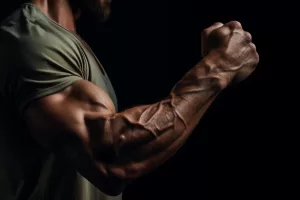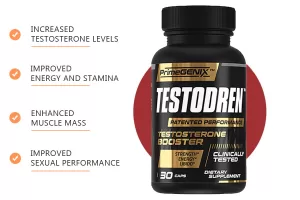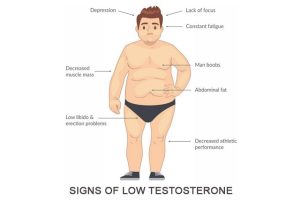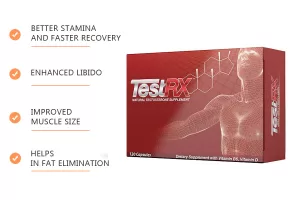The human body is built of multiple organs and systems. But how would they work without proper regulation? Well, that’s the reason we have hormones. These tiny chemical messengers get directly into the bloodstream to get to every organ and system to ensure their proper function. And while there are more than 50 of them, today we’ll concentrate on testosterone and estrogen.
What Are Hormones?
Hormones are secreted by the endocrine glands to regulate the functioning of all organs and cells. They are responsible for multiple processes in the human body, including homeostasis, sleep-wake cycles, menstrual cycle in women, growth, and our overall health.
Testosterone and Estrogen Difference
The main dissimilarity between them lies in their effects. The masculine appearance of people of the male sex is the result of testosterone activity. The feminine appearance, on the other hand, is what estrogen does in a female body. Nevertheless, both are present in people regardless of sex. Testosterone vs. estrogen behavior in the body of a man and a woman cannot be compared due to the difference in the amount of these chemicals.
Estrogen
This hormone plays an essential role in the female body, as it regulates the reproductive function in women and promotes the development of secondary sexual characteristics in females. This chemical substance is predominantly produced by the ovaries, though small amounts of estrogen are secreted by adrenal glands and fat tissue.
Testosterone
Like estrogen in women, testosterone regulates reproductive and sexual function in men, though this hormone is produced in both sexes. In men, the primary source of testosterone is the testicles. Some amounts of the hormone are also produced by the adrenal glands. In women, this chemical is secreted by the ovaries, though its quantity is six to eight times smaller than men’s.
Effects of Testosterone
Physical
The physical effects of testosterone are best noticeable in puberty when the levels of hormones in the male body start growing. Some of them include:
- the growth of body hair;
- facial hair;
- deepening of the voice;
- growth of the genitals;
- muscle growth.
The latter doesn’t stop with the puberty period. Testosterone promotes muscle mass increase in men regardless of age if they work out. Some men use testosterone pills to boost their muscle growth.
Emotional and Psychological
Aside from the physical impact, testosterone also has a powerful effect on the male emotional and psychological condition. Healthy T-levels allow men to feel more motivated and energetic and have better self-esteem. Also, this hormone is considered responsible for male aggression and rivalry.
Long-term Health Impacts
Testosterone is an essential component attributing to strong bones. Besides, it works like a stimulator for red blood cell production in the bone marrow. Healthy T-levels also ensure male sexual health, which includes high sex drive, strong and stable erections, and proper spermatogenesis.
Low Testosterone
A drop in T-levels brings multiple health issues, especially in men.
Causes
Factors contributing to low testosterone include:
- aging and the associated natural drop in the hormone production;
- illness: some medical conditions, particularly type 2 diabetes, obesity, testicular cancer, and other health disorders;
- lifestyle factors, like excessive alcohol consumption, smoking, stress, and a lack of sleep, can also cause a testosterone level drop.
Symptoms
A drop in testosterone and estrogen never goes unnoticed by our bodies. Here are some of the low T symptoms you may experience:
- fatigue;
- depression;
- low/no interest in sex;
- receding body and facial hair;
- excessive weight and obesity.
Health Implications
Low levels of the male sex hormone lead to multiple health implications. Some of the most often reported health issues are:
- low bone density (osteoporosis);
- cardiovascular health issues (high blood pressure, heart disease);
- erectile dysfunction;
- male factor infertility due to low sperm count, and many more.
High Testosterone
Hormonal imbalance is not good, and high testosterone is no exception.
Causes
The reasons for your testosterone to go up vary. Still, most of them are due to some external factors, like testosterone supplement intake and the use of anabolic steroids for muscle growth. Rarer, the cause of excessive T-levels is a medical condition. For instance, Cushing’s syndrome, adrenal tumors (malignant and benign), and certain inborn conditions.
Symptoms
Increased testosterone causes a range of symptoms, which include but are not limited to:
- increased aggression;
- high risk of heart attack and stroke due to high blood pressure;
- acne;
- headaches;
- sleep disorder;
- fluid retention and the associated body mass growth.
Health Implications
Excess of testosterone can trigger the development of atherosclerosis and heart health issues due to the growth of “bad” cholesterol levels. Also, hormonal imbalance can cause infertility, sleep apnea, and emotional instability that shows through aggression and bad mood.
Effects of Estrogen
Physical
Both estrogen and testosterone in females influence their physical appearance and reproductive function. Still, the female hormone is what makes a woman woman. The physical effects of this hormone include:
- menstrual cycle regulation;
- growth and development of breasts;
- maturation of the vagina and the uterus in puberty.
Emotional and Psychological
Healthy estrogen levels allow women to feel energetic and be in a good mood. It also influences female cognitive function, promoting better verbal memory, motor skills, and spatial ability. Hormonal fluctuations within the female menstrual cycle may significantly affect women’s mood and overall emotional condition.
Long-term Health Impacts
The presence of estrogen in the female body is essential for cardiovascular health because the hormone helps to prevent the formation of atherosclerotic plaques, allowing female to keep their hearts and vessels healthy. Also, estrogen is needed to sustain bone density and a strong skeleton.
Low Estrogen
Estrogen deficiency is devastating for the female body. Let’s see what can cause it and what symptoms signal a problem.
Causes
You can experience low estrogen for several reasons.
- Menopause – the natural decay of the female reproductive function, marked by a significant estrogen drop.
- Certain medical conditions. Thyroid disorders and pituitary gland disease may be the cause of low estrogen.
- Receiving certain treatments, like chemotherapy or radiation therapy.
Symptoms
Low estrogen can show through:
- hot flushes;
- tiredness;
- breast tenderness;
- dry skin;
- weight gain, especially in the belly area;
- mood swings and increased irritability;
- irregular periods.
Health Implications
Low bone density is one of the long-term effects of low estrogen. A lack of this hormone will also cause multiple reproductive function issues, including infertility.
High Estrogen
High testosterone and estrogen in women is as bad for women as it is for men.
Causes
The typical cause of high estrogen is the intake of estrogen supplements or other preparations containing this hormone. Still, you may face such a problem due to certain medical conditions, including liver disease and breast cancer.
Symptoms
You can suspect your estrogen levels to be too high if you have such symptoms:
- headaches (sometimes migraines);
- tender breasts;
- heavy menstrual bleeding;
- severe PMS;
- weight gain.
Health Implications
High estrogen boosts your risks of certain forms of hormone-dependent cancers. Besides, there is some scientific evidence that high estrogen promotes the development of liver disease.
Managing Hormonal Imbalance
Taking control of your hormone levels is essential for healthy living. Here are several things you can do to manage your imbalance.
Hormone Replacement Therapy
Estrogen and testosterone pill intake is the basis of hormone replacement therapy. If, for some reason, your body cannot produce enough hormone, you need to get it from artificial sources. This method works best for menopausal women and those people whose hormones dropped due to chemotherapy, gland loss, or dysfunction.
Natural Remedies
Often, the cause of hormonal imbalance lies in the wrong lifestyle choices. To get rid of this problem, you can do at least some of these things:
- be more physically active if you have high estrogen or low testosterone; reduce your physical activity if your estrogen is too low.
- enrich your diet with foods that promote estrogen production (berries, dried fruits, flaxseeds, etc.) or testosterone levels growth (eggs, beans, garlic, spinach).
- undergo regular medical checkups to notice any issues as they begin.
- cut on drinking alcohol and stop smoking to normalize your hormone production.
Your GP can give more recommendations, so visit a doctor if you have a problem.
Medication
The intake of certain medications can help normalize your testosterone and estrogen function. Depending on whether you have excess or deficiency of hormones, your doctor may recommend taking antihormone therapy, estrogen receptor modulators (in women), or testosterone supplements (in men).
Summary
When comparing testosterone vs. estrogen structure, they are very similar. However, the effects imposed by testosterone in the male body and those it produces in the female body are very different. The same is true for estrogen. Any significant deviations in the levels of testosterone and estrogen can cause severe, long-term health implications, so it’s essential to keep your levels healthy.
FAQ
What is the relationship between estrogen and testosterone?
Testosterone and estrogen are hormones responsible for secondary masculine and feminine characteristics. Both are present in the human body, yet in different amounts.
Does high testosterone cause high estrogen?
Estrogen level growth is a typical body’s reaction to the growing levels of testosterone. This happens due to the testosterone-estrogen conversion.
What does estrogen do to a man?
Estrogen is essential for spermatogenesis, male libido, and erectile function. However, its excess can cause sexual dysfunction and other health issues in males.
Can you have estrogen and testosterone at the same time?
Yes, both are naturally present in male and female bodies.







